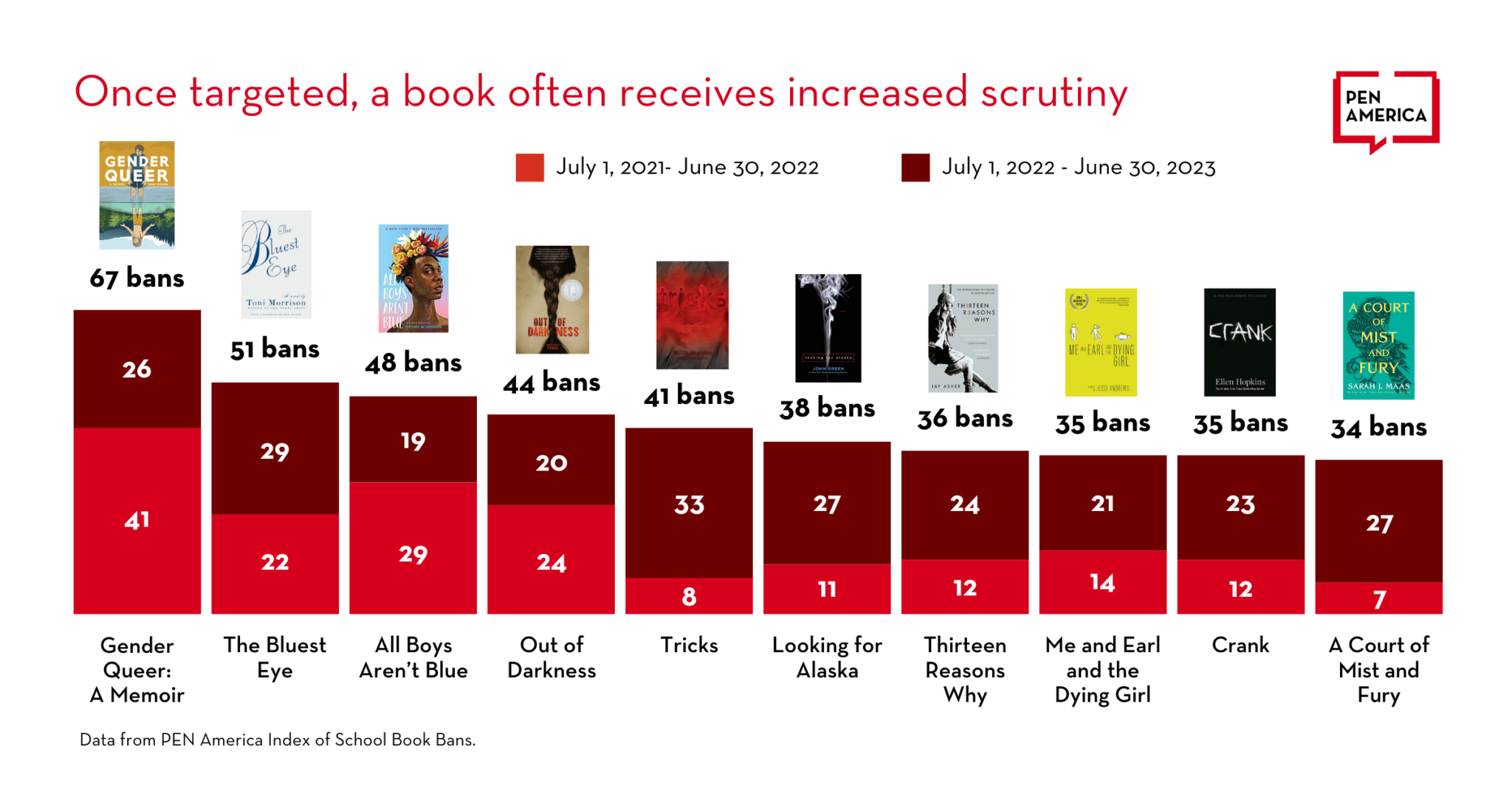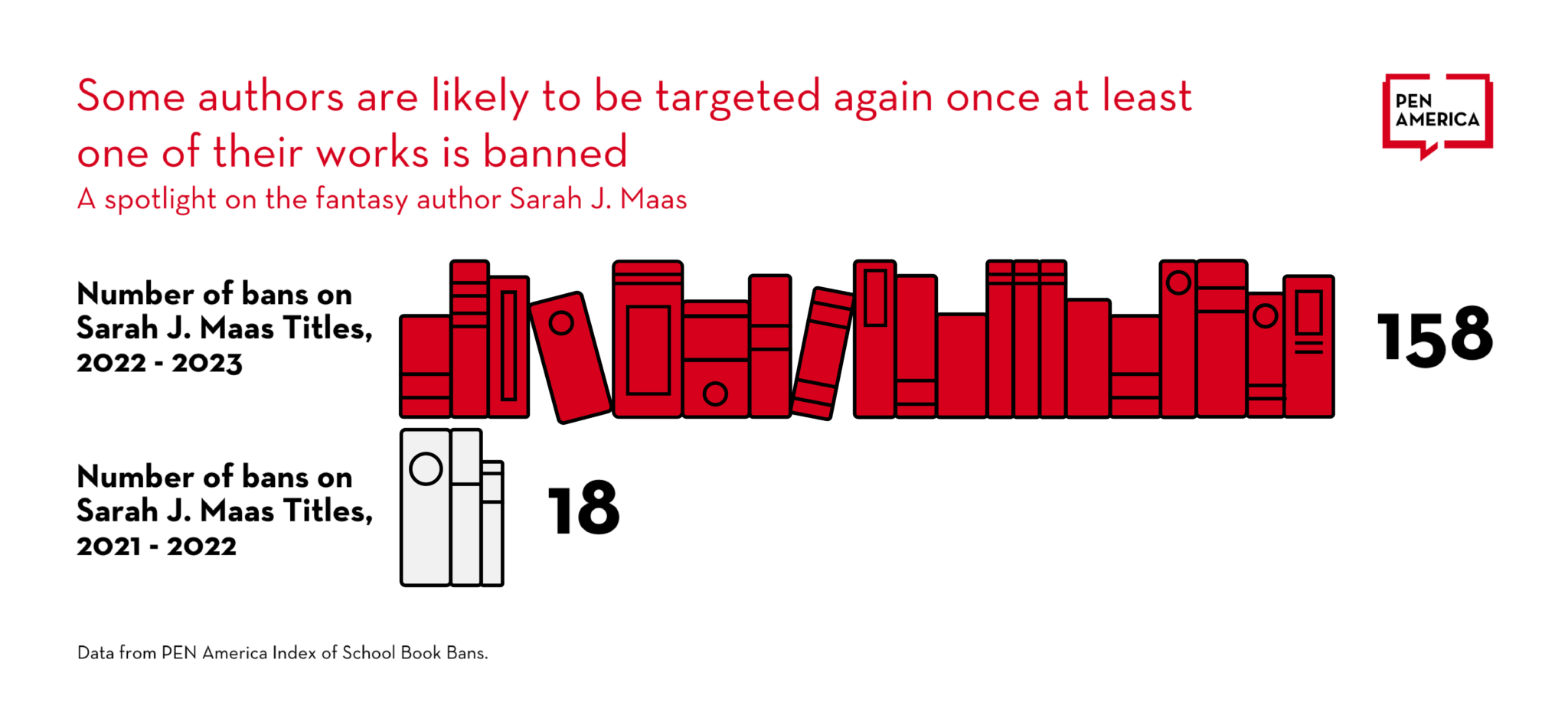PEN America Releases New Data and Analysis on Two Years of Book Banning
PEN America's report, Spineless Shelves: Two Years of Book Banning, shows the spread of copycat book bans, as well as how several titles from an author were targeted after one of their works was banned.
PEN America today released a data summary looking at nearly 6,000 book bans in public schools
 |
Graphic credit: PEN America |
documented from July 2021 to June 2023. Over the 2021-22 and 2022-23 school years, the sweeping attack on the freedom to read in public schools impacted 247 school districts across 41 states, PEN America said. Spineless Shelves: Two Years of Book Banning demonstrates two phenomena: copycat bans and a "Scarlet Letter" effect on authors.
The copycat bans can be seen clearly after books that are banned in one district can be found on challenged and banned lists in school districts across state lines. The report offers this example: In the 2021-2022 school year, Sarah J. Maas's work was banned 18 times across 10 districts. In 2022-23, that exploded to 158 bans across 36 districts, a 778 percent increase. As PEN America explored in Banned in the USA: The Growing Movement to Censor Books in Schools, groups pushing for book bans frequently share lists of targeted titles to target.
 |
Graphic credit: PEN America |
Those authors not only find people pushing to censor a book in many districts after it has been challenged in one; when they have a book banned, more of their titles are targeted. The organization calls this the Scarlet Letter effect and once again uses Maas as an example. In the 2021-2022 school year, eight of her titles were banned. This doubled to sixteen titles in 2022-23. A similar effect has impacted bestselling authors Ellen Hopkins, Jodi Picoult, Alice Oseman, Laurie Halse Anderson, and Rupi Kaur, among others, according to the report.
 |
Graphic credit: PEN America |
Read the full PEN America press release for Spineless Shelves: Two Years of Book Banning below.
|
Data from Two School Years of Book Banning Show Spread of Copycat Bans and a “Scarlet Letter” Effect Where Some Banned Authors Are Repeatedly Targeted (NEW YORK)- In a cumulative data summary released today, PEN America reflects on the nearly 6,000 book bans in public schools documented from July 2021 to June 2023. Spineless Shelves: Two Years of Book Banning illustrates the spread of copycat book bans and an apparent “Scarlet Letter” effect, where several works from an author’s catalog were subsequently targeted after at least one of their works was banned. Over the 2021-22 and 2022-23 school years, the sweeping attack on the freedom to read in public schools impacted 247 school districts across 41 states, affecting millions of students, the century-old free expression and literary group said. The data summary pulls together data from PEN America’s July 2021 to June 2023 School Book Ban Indexes for the first time and provides new insight into the movement to censor books nationwide. “Literature is vital to educate young people,” said Sabrina Baêta, of PEN America’s Freedom to Read program. “Without literary works, students are left without context for their own experiences, without empathy for the experiences of others, and without a full understanding of the world we live in and the past. We are continually alarmed to see how the movement to ban books has intensified since 2021 and puts at risk the freedoms to read and learn, all the while threatening core principles of education.” In the new data summary, PEN America reflects on two phenomena: copycat bans and a “Scarlet Letter” effect. Books that are banned in one district are frequently banned in others, with such “copycat” bans proliferating in school districts across state lines. A useful example is the work of Sarah J. Maas. In the 2021-2022 school year, her work was banned 18 times across 10 districts; but in 2022-23, that exploded to 158 bans across 36 districts – a 778% increase. As PEN America explored in Banned in the USA: The Growing Movement to Censor Books in Schools, groups pushing for book bans frequently share lists of titles to target, which has inflamed this copycat effect. Several authors have also experienced a “Scarlet Letter” effect, where several works from their collection were subsequently targeted after at least one of their works was banned. This is again illustrated by author Sarah J. Maas. In the 2021-2022 school year, eight of her titles were banned. This doubled to sixteen titles in 2022-23. A similar effect has impacted bestselling authors Ellen Hopkins, Jodi Picoult, Alice Oseman, Laurie Halse Anderson, and Rupi Kaur, among others, all of whom saw more of their catalogs scrutinized after one of their works was initially targeted for banning. “Book banners have effectively marked a group of authors with a ‘scarlet letter,” which has intensified the pace and scope of book banning in schools,” said Kasey Meehan, Freedom to Read program director at PEN America. “We have long raised alarm over book bans undermining the freedom to read for students and families, but we are similarly concerned about the effects on authors, and the freedom to write.” From July 2021 to June 2023, PEN America’s Index of School Book Bans recorded 5,894 instances of book bans. Florida and Texas lead the country in number of bans, but the crisis has spread to 41 states. A significant increase in the number of books banned from both school libraries and classrooms indicates not only an increase in the number of books banned, but that more of the bans are being enacted as permanent removals. Since 2021, PEN America has been at the forefront of documenting and defending against the unprecedented rise of school book bans nationwide. Depriving students of both classic and contemporary literary works flies in the face of basic constitutional freedoms and PEN America is suing Escambia County, Florida, over its book bans. Black and LGBTQ+ authors and books about race, racism, and LGBTQ identities have been disproportionately affected in the book bans documented by PEN America in the last year and a half. The wave of book banning is worse than anything seen since the McCarthy Red Scare era of the 1950s. PEN America defines a school book ban as any action taken against a book based on its content and as a result of parent or community challenges, administrative decisions, or in response to direct or threatened action by lawmakers or other governmental officials, that leads to a previously accessible book being either completely removed from availability to students, or where access to a book is restricted or diminished. |
RELATED
The job outlook in 2030: Librarians will be in demand
The job outlook in 2030: Librarians will be in demand
ALREADY A SUBSCRIBER? LOG IN
We are currently offering this content for free. Sign up now to activate your personal profile, where you can save articles for future viewing





Add Comment :-
Be the first reader to comment.
Comment Policy:
Comment should not be empty !!!